NEWS
What really grates with Bill Gates and his preachy new book is the assumption that a billionaire knows best about climate change
Published
3 years agoon
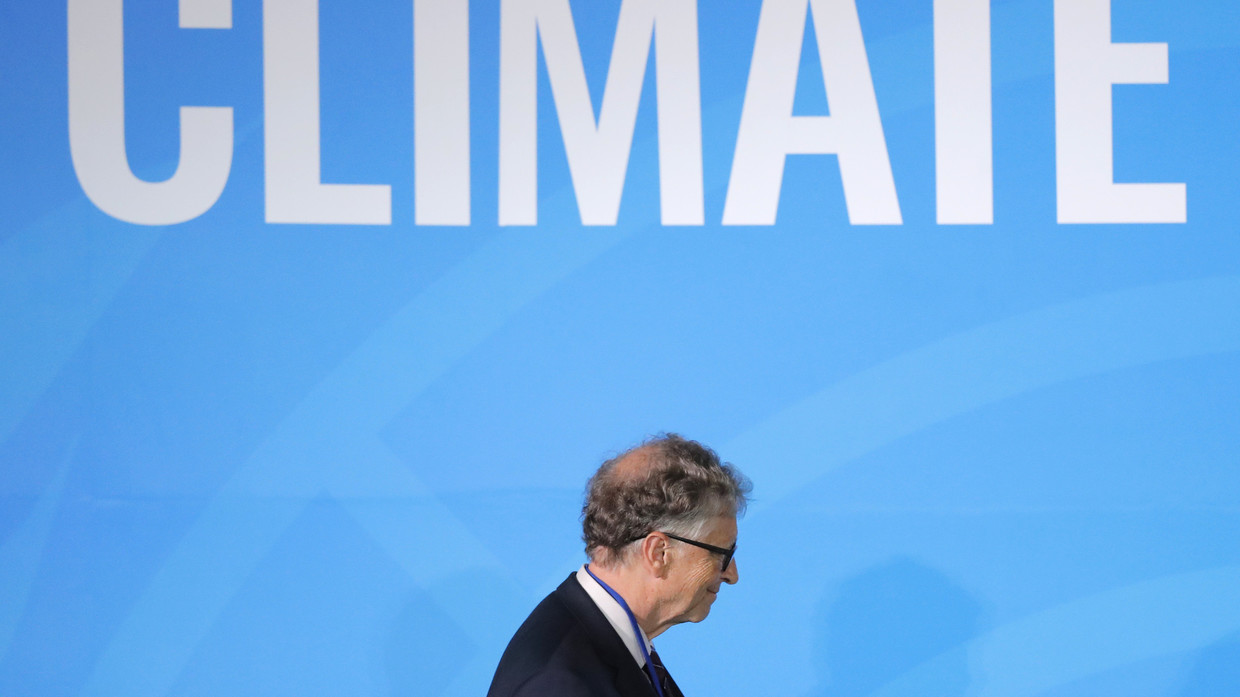
Hypercritical philanthropist Bill Gates, who’s worth more than $100bn, flies around the world using private jets to tell us it’s we ordinary people who must change our behaviour and be less well-off in order to ‘save the planet.’
The billionaire former Microsoft boss-turned-global-philanthropist has a new book out, promoting a one-sided ‘net zero’ agenda – but at least he recognises how difficult the task is and concedes that, given he owns four private planes and lives in a 66,000 sq-ft mansion that boasts 24 bathrooms, he is “an imperfect messenger on climate change.”
How to Avoid a Climate Disaster is Bill Gates’ attempt to stump up support for drastic action on reducing greenhouse gas emissions. He rightly suggests that a warming world is going to cause problems for humanity. He notes that comparatively small changes in average temperatures mean that things will look very different in the future. “In climate terms, a change of just a few degrees is a big deal,” he says. The last ice age was just six degrees cooler than today, he notes, and there were crocodiles in the Arctic Circle when dinosaurs last roamed the earth and the world was just four degrees warmer than today.
A warmer world, says Gates, would spell problems for coastal cities and low-lying countries, would leave many farmers with less water, increase the risk of unbearable temperatures causing heatstroke, lead to both increased drought and flooding, cause armed conflict and more refugee crises, and much more. (Many of these claims are actually far more controversial than he lets on.) Climate change, he argues, will kill far more people in the long run than Covid-19. That’s true, but so will many other things, from heart disease and tuberculosis to malnutrition. Is it desirable to obsess about one particular problem?
As ever with the climate narrative, change is only ever seen as a downside. The potential plus sides of a warmer world are rarely mentioned, such as opening up new areas for agriculture in higher latitudes, for example. Cold weather is a bigger killer than hot weather. And, as a resident of Scotland, the possibility of warmer summers might make holidays ‘at home’ a lot more enjoyable.
There is also the question of how to deal with problems when they arise. Gates discusses the spread of tropical diseases like malaria to places “where they’ve never been seen before,” apparently unaware that malaria was endemic in Europe until near-eradication as recently as the 1950s. Malaria cases and deaths have fallen dramatically over the past decade or so, particularly in south-east Asia, suggesting that more economic development and better healthcare can have a huge impact. Would it not be better to tackle a problem like disease directly, in the hope of eradicating or greatly reducing it, rather than hoping that hugely expensive cuts in greenhouse gas emissions might avoid a proportion of cases in the future?
Still, if Gates’ book has merit, it is in drawing attention to how difficult it would be to slash greenhouse gas emissions. Building a few more wind farms, driving an electric car and scrupulously recycling your plastic bottles might seem like the right thing to do, but such changes really only scratch the surface.
Fossil fuels are absolutely central to our lives. They are a wonderful discovery, providing huge amounts of energy in a very compact form. Gates notes that, pound for pound, gasoline is 35 times more energy dense than the best lithium-ion batteries available today. Our emissions don’t simply come from generating electricity (27 percent of emissions) and moving around (16 percent of emissions). Making things – particularly concrete and steel – produces 31 percent of emissions, but there are few alternatives to those materials right now.
Agriculture is another big source of emissions, and no amount of plant-based food and ‘lab grown’ meat can wipe those out entirely. Indeed, should we want them to? Animals turn things that are inedible to humans – particularly grass – into highly nutritious food. Looking out of my window in rural Scotland at the hills opposite, sheep and cows are producing food from a landscape where arable farming would be impossible.
Gates is right to point out that it would be impossible to get to ‘net zero’ emissions (that is, cut all the emissions we can and then capture greenhouse gases from the atmosphere to deal with the rest) without a huge investment in new technologies like safe, cheap nuclear power, alternatives to cement and much, much more. At least in that regard, he has much in common with other critics of climate-change policies like Bjorn Lomborg and Michael Shellenberger.

Bill Gates admits his ‘large carbon footprint’ makes him a ‘strange person’ to pressure others – as he plugs climate-change book
But what really grates with Gates is the assumption that the worldview of a very rich man – even one who seems to be well-meaning – should inform public policy more than the democratic decisions of voters. The political classes, particularly in Western Europe, are of one mind that ‘net zero’ is a desirable goal, whatever the cost. That means we can’t even have our say at the ballot box – there is no one critical of this agenda to vote for.
While Gates leans towards technical solutions and policy ‘nudges’ in the right direction from governments, the reality is that driving down emissions will require us plebs to do and have less: less driving, fewer flights, less meat, and so on.
Climate change and the ‘great reset’ is the outlook of middle-class politicians and Davos-attending billionaires, who sit around shaking their heads and tut-tutting at the dreadfully selfish consumption of ordinary people in developed countries before heading home to their mansions on their private jets.
This is not to say that there should be no effort to reduce greenhouse gas emissions. A world getting warmer more slowly would be a good thing, because adapting to change can be costly.
And there are some big gains to be made along the way. If electric cars can be made more convenient and affordable, they could greatly reduce air and noise pollution in cities. Electric cars are also easier to drive and maintain than petrol- and diesel-powered vehicles. Serious increases in funding for research and development could enable us to unleash new sources of power that are not only cleaner, but bountiful, too. ‘Lab made’ meat that could produce a delicious steak without all the hassle of rearing cattle is a great idea, in principle.
But at present, the focus on climate change not only always leads to the conclusion that we must do less, that the great bulk must be worse off, but it is also an opportunity cost. What if the smartest minds on the planet were laser-focused on raising the living standards of everyone on the planet? Couldn’t we make even greater strides to improve the lot of humanity?
Many commentators believe that Gates and other Silicon Valley billionaires are on a mission to take over the world. I don’t believe that there is such a huge conspiracy going on. But Gates, Jeff Bezos and the rest do have the money to throw around to influence the political agenda towards their own concerns, potentially leaving the rest of us worse off. The absence of a serious political debate about the merits of the goal of ‘net zero’ is the most troubling thing of all.
“I can’t deny being a rich guy with an opinion,” writes Gates, in an effort to explain away his lifestyle as being incompatible with his climate-change preaching. “It’s true that my carbon footprint is absurdly high.
“I own big houses and fly in private planes – in fact, I took one to Paris for the climate conference – so who am I to lecture anyone on the environment?” Indeed.

The Bundeswehr decided to jettison inventory that does not fit new dispensers
The German military is auctioning off nearly 10,000 rolls of toilet paper that do not fit new dispensers at Bundeswehr facilities, local media reported on Monday.
According to a posting on the Vebeg online auction platform, which was picked up by the German TV network RTL, the Bundeswehr is offering a total of 12 pallets of toilet paper stored in 360 boxes that has a transport weight of over 3 tons.
While it is unclear when exactly the ad was posted, the auction is scheduled to last until May 31. The winning bidder will be able to pick up the toilet paper, which was produced by the Sweden-based company Tork, at the military barracks in the city of Wesel, not far from Munster in the northwestern part of the country.
Potential buyers will need to register with the military department where the inventory is being stored before coming to the premises to pick it up or view it, the ad reads.
Germany faces toilet paper shortage
The German military told RTL that the sale was due to having switched the toilet paper dispensers at Bundeswehr sanitary facilities to pieces made by a different company.
“However, the toilet paper from the first company cannot be used in a universal hygiene dispenser,” a Bundeswehr spokesman told the outlet.
According to RTL, the German military has also put printer toners, desks, and laptops up for sale.
The state of the Bundeswehr stocks of weaponry and other equipment and amenities has been an issue of concern in Germany. In March, Eva Hogl, who serves as the country’s parliamentary commissioner for the armed forces, claimed that the Bundeswehr “has too little of everything and it has had even less since February 24, 2022,” referring to when Russia started its military campaign in Ukraine. Since then, Berlin has provided massive military and economic support to Kiev.
She noted that the German army also lacked “functioning toilets, clean showers… indoor sports facilities, troop kitchens… and last but not least, wireless internet.”
Hogl also pointed out that the government had failed to spend any of the money from a €100 billion ($108 billion) special defense fund created last year in light of the Ukraine conflict.
You can share this story on social media:
PLEASANT MUSIC FOR YOUR CAFE, BAR, RESTAURANT, SWEET SHOP, HOME
SUITABLE MUSIC FOR YOGA LOVERS
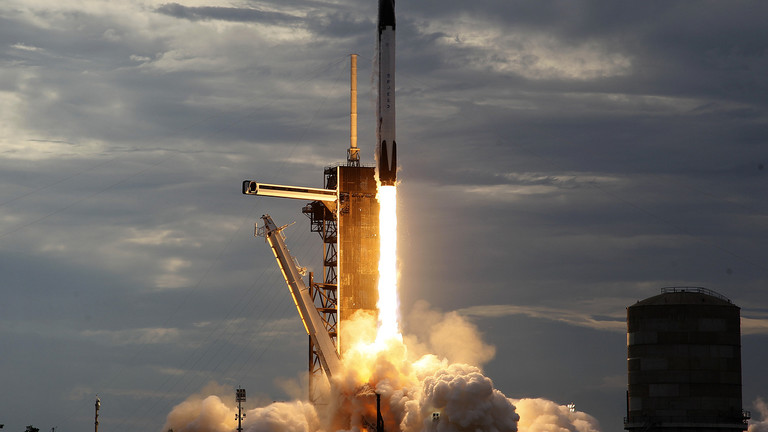
The Falcon 9 has successfully blasted off on a private mission carrying Saudi and American astronauts to the ISS
A SpaceX Falcon 9 rocket successfully launched from NASA’s Kennedy Space Center in Florida on Sunday, on a mission from the Houston-based company Axiom Space. It also carried the first Saudi woman to travel to the cosmos.
The mission, dubbed Ax-2, is Axiom’s second private mission bound for the International Space Station. The company utilized SpaceX’s Dragon spacecraft, named Freedom, to carry the crew and the Falcon 9 to deliver it from Earth’s atmosphere.
Shortly after liftoff, the first stage of the Falcon 9 rocket successfully performed a boost-back burn to SpaceX’s Landing Zone-1 and touched down safely about seven minutes and 45 seconds after launch.
The Dragon then detached from the Falcon 9’s upper stage some 12 minutes after liftoff and headed to the ISS to perform a docking scheduled for Monday.
Aboard Freedom are the first two Saudi Arabian nationals to travel to the ISS, including stem cell researcher Rayyanah Barnawi – the first Saudi woman ever to enter space. Joining the Ax-2 as mission pilot is businessman John Shofner, who paid out of his own pocket for the trip.
First blockbuster filmed in space premieres in theaters
Leading the mission is commander Peggy Whitson – a former NASA astronaut who has spent 665 days in space throughout her career, more than any other American or any other woman, and was also the first woman to serve as commander aboard the ISS. She currently works as Axiom’s director of human spaceflight.
The four-person crew is expected to spend eight days aboard the ISS, living and working alongside the seven astronauts currently residing there. They will also conduct independent research, including into how people that have not undergone rigorous training will react when first introduced to microgravity.
Axiom has announced plans to further develop commercialized spaceflight and even launch its own free floating private space station by the end of the decade. The first module of this future station is expected to be sent up to the ISS next year, with another three pieces to follow by the end of 2027.
You can share this story on social media:
PLEASANT MUSIC FOR YOUR CAFE, BAR, RESTAURANT, SWEET SHOP, HOME
SUITABLE MUSIC FOR YOGA LOVERS
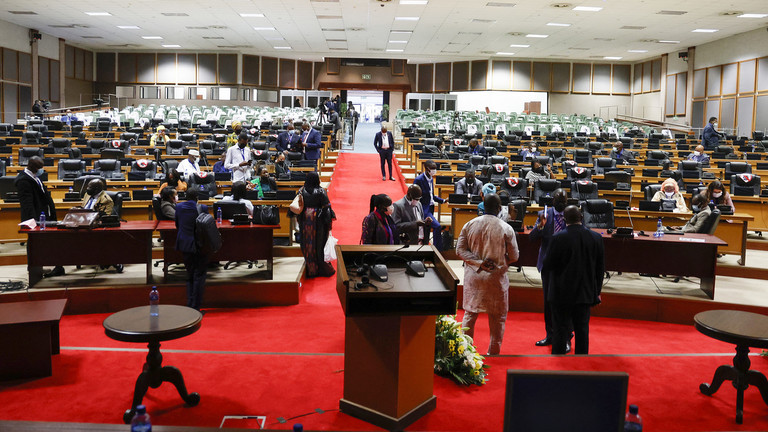
The move may prompt more African nations to ratify the Malabo Protocol, a political analyst told TSFT
Kenyan President William Ruto says his country will ratify the 2014 Malabo Protocol by September in a move towards making the Pan-African Parliament (PAP) an official legislative organ of the African Union (AU).
The Malabo Protocol seeks to convert the PAP into a full-fledged legislative body, which would hold jurisdiction over international and transnational organized crimes; in other words, creating an African international crimes court.
The protocol must be approved by at least 28 countries before it can enter into force. However, only 15 of the 22 signatories to the protocol in 2014 have ratified it, making Kenya the 16th.
Ken Bosire, a Kenyan political analyst, told RT that Nairobi’s decision to give the PAP legislative power is a “positive move” that could inspire other African leaders to follow suit. “The new president of Kenya seems to have some kind of persuasive sway among leaders of the region,” he added.
You can share this story on social media:
PLEASANT MUSIC FOR YOUR CAFE, BAR, RESTAURANT, SWEET SHOP, HOME
SUITABLE MUSIC FOR YOGA LOVERS



Global debt balloons to record highs

German military to sell tons of toilet paper

First female Saudi astronaut heads to space

Nigeria takes step to combat fuel shortages

US will default if debt deal fails – treasury secretary

Village People demand Trump stop using their music

Hollywood star pulls out of hosting awards show amid strike

Rock icon slams German authorities

Agatha Christie novels chopped by ‘sensitivity readers’ – media

Marvel star back in training after breaking over 30 bones

Turkish minister escapes fire blast (VIDEO)

Trump savages pop star’s Super Bowl performance

Alec Baldwin sued by Ukrainian family of slain cinematographer

Duran Duran stumbles, Dolly Parton rolls into Rock Hall

Sweden probes possible plot behind Russian pipeline leaks

FINANCE


Global debt balloons to record highs
It’s now $45 trillion higher than its pre-pandemic level and is expected to continue growing rapidly, a top trade body...


Nigeria takes step to combat fuel shortages
The West African country has built a giant oil refinery to cover domestic demand Nigeria will commission its new Dangote...


US will default if debt deal fails – treasury secretary
The current borrowing limit is a constraint on Washington’s ability to meet its obligations, Janet Yellen insists America’s chances of...


Facebook parent Meta fined €1.2 billion by Irish watchdog
The American tech company has been accused of violating EU data privacy rules US tech giant Meta has been hit...


UK’s business with sanctioned country booming
Trade between Britain and Iran has reached the highest level in a decade, according to official data, apparently having been...

POLITICS


Erdogan election defeat would be ‘revenge’ – Syrian Kurds
The YPG claims the Turkish president failing to win another term would be payback for Ankara’s counter-terrorism operations in Syria...


Chinese special envoy meets with Zelensky
Li Hui visited Kiev to share Beijing’s views on a political settlement to the Ukraine crisis Ukrainian President Vladimir Zelensky...


Pakistan’s top court orders release of former PM Imran Khan
Pakistan’s Supreme Court has ordered the release of former prime minister Imran Khan, whose arrest earlier this week triggered deadly...


Kamala Harris to run AI taskforce
The US vice president will ask AI execs to evaluate the safety and fairness of their models US Vice President...


Most Americans want to move on from Biden and Trump – poll
70% of respondents said the incumbent shouldn’t bid for office in 2024, with that figure 60% for the Republican former...

OPINION


Disgraced ex-PM Liz Truss seeks to ruin any hopes for normal UK-China ties
The former premier’s Taiwan trip is nothing but a provocation for Beijing to lash out at London, sinking any constructive...


India facing challenge to steer SCO agenda away from Western-dominated frameworks
The Shanghai Cooperation Organisation is looking at ways to address the most pressing global issues without being a disruptive influence...


China isn’t the biggest threat to Italy’s prosperity
Rome is considering leaving the Belt and Road Initiative in a move which will place virtue signaling to other Western...


Meet the Czech lawyer who rallies thousands to shake up the EU establishment
In mid-April, a fledgling political party that recently formed in the Czech Republic called Pravo Respekt Odbornost (Law Respect Expertise;...


UK shows signs of good will to China, but it’s not the one calling the shots in this relationship
The British foreign secretary says antagonizing Beijing goes against London’s ‘national interests’, but Washington has other ideas British Foreign Secretary...

LIFE


conic Smiths bassist dies aged 59
The bassist with legendary English rock band The Smiths, Andy Rourke, has died at the age of 59, the group’s...


Village People demand Trump stop using their music
A viral video emerged last week of Donald Trump dancing to a Village People song at his Florida estate Village...
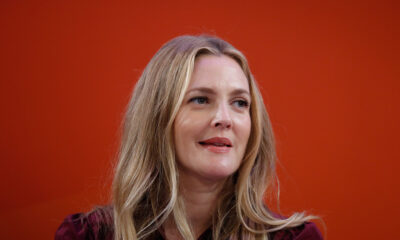

Hollywood star pulls out of hosting awards show amid strike
Drew Barrymore is stepping down as host of this year’s MTV Movie & Music Awards, due to be held on...
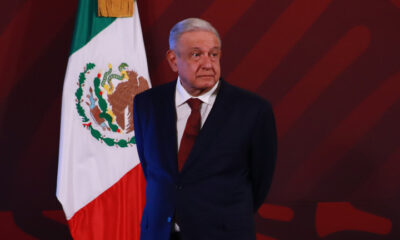

Mexico condemns US ‘interference’ in drug war
The DEA’s infiltration of the Sinaloa Cartel without state permission amounts to espionage, the Mexican president says Mexican President Andres...


Rock icon slams German authorities
Pink Floyd co-founder Roger Waters criticized the city of Frankfurt for canceling his concert and vowed to take legal action...



Trending
-

 FINANCE12 months ago
FINANCE12 months agoFacebook parent Meta fined €1.2 billion by Irish watchdog
-

 LIFE12 months ago
LIFE12 months agoconic Smiths bassist dies aged 59
-
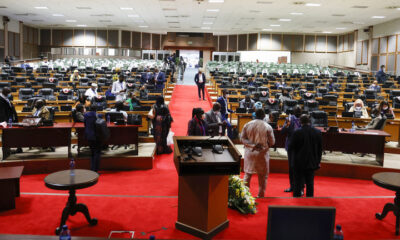
 NEWS12 months ago
NEWS12 months agoKenya supports creation of pan-African court
-

 FINANCE12 months ago
FINANCE12 months agoUS will default if debt deal fails – treasury secretary
-

 FINANCE12 months ago
FINANCE12 months agoGlobal debt balloons to record highs
-

 POLITICS12 months ago
POLITICS12 months agoKamala Harris to run AI taskforce
-
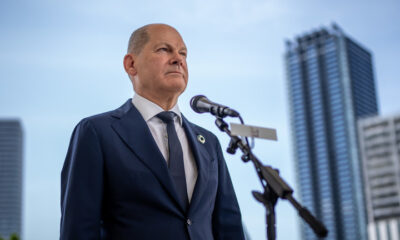
 WAR12 months ago
WAR12 months agoUkraine won’t join NATO anytime soon – Scholz
-

 FINANCE12 months ago
FINANCE12 months agoParis justifies nuclear ties with Moscow




